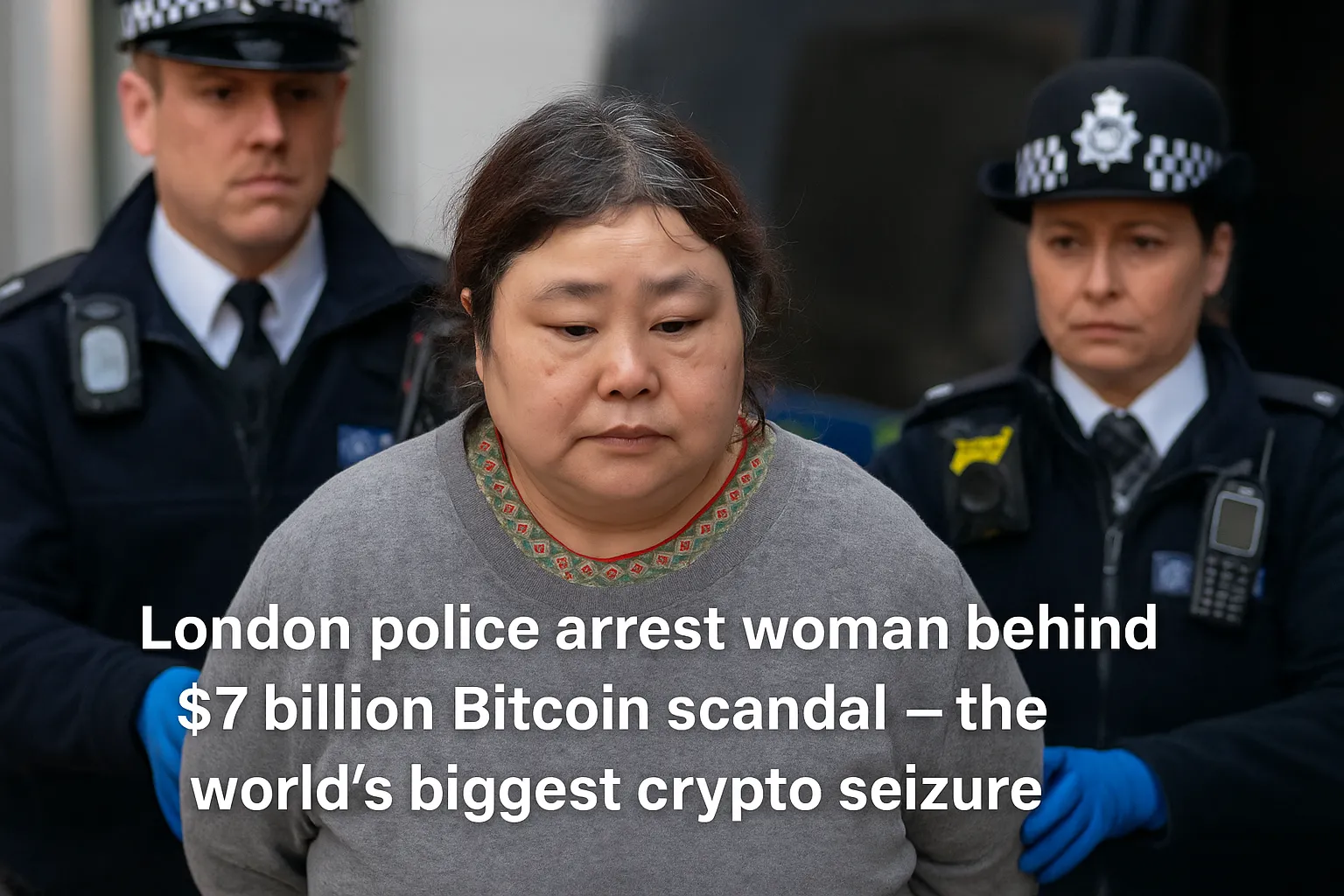When London police seized 61,000 bitcoins — worth nearly $7 billion — from a Chinese woman dubbed the crypto queen, it instantly became the largest cryptocurrency confiscation in world history. Behind the polite courtroom statements lies a disturbing truth: the dream of financial freedom that crypto promised has turned into a new kind of digital slavery — borderless, seductive, and devastating.
The Rise of a Digital Monarch
Between 2014 and 2017, Zhimin Qian built an empire in China on deception wrapped in innovation. Her “investment” programs promised 300 percent returns. She spoke the language of progress, telling investors that blockchain was the future and that they could join it early.
Over 128,000 people believed her. Teachers, small business owners, retirees — all chasing the same illusion: a ticket to the digital elite. But when authorities started asking questions, Qian liquidated her accounts, moved the money into bitcoin, and disappeared. Crypto’s myth of anonymity became her cloak of invisibility.
A New Life in London
Qian resurfaced in London under a false identity. She lived comfortably in upscale neighborhoods, moving millions through intermediaries. One of them, Jian Wen, helped her buy luxury properties, jewelry, and art. Everything looked legitimate on paper — until police noticed the crypto trail.
In 2018, officers raided a house in Hampstead and found encrypted devices containing 61,000 BTC. At the time, the stash was worth about £1.4 billion. By 2025, its value had soared past £5.5 billion — more than the GDP of some small nations.
The Mainstream Narrative
British headlines called her the crypto queen, marveling at the scale of her digital fortune. Most reports celebrated the police success — the largest crypto seizure in history. Yet few questioned how it was possible for billions in untraceable assets to circulate across borders for nearly a decade without regulators noticing.
The mainstream story was simple: a clever fraudster, finally caught. But beneath it lies something far more alarming — a global ecosystem of financial opacity that governments still struggle to confront.
The Oppositioner View: Crypto’s Moral Failure
Qian’s empire didn’t grow in a vacuum. It thrived in the same ideological space that turned bitcoin into religion. Crypto evangelists promised liberation from banks and governments. What they built instead was a system without accountability.
Regulators, intoxicated by “innovation,” looked the other way. Western financial centers — London, Zurich, Singapore — welcomed crypto capital with open arms, never asking where it came from. For every Qian who gets caught, dozens more operate under the radar, laundering billions through DeFi protocols and anonymous wallets.
Crypto’s tragedy isn’t technical — it’s moral. It’s the story of how the language of freedom became the grammar of fraud.
Anatomy of the Scam
- Victims: about 128,000 people in mainland China.
- Funds converted to crypto: 61,000 BTC.
- Estimated 2025 value: $7 billion.
- Charges: possession of criminal property under the UK Proceeds of Crime Act.
- Plea: guilty, September 2025.
- Sentencing: scheduled for November 2025.
The Metropolitan Police confirmed it was the largest crypto seizure in British history — and likely the largest worldwide. Jian Wen, the British intermediary, was earlier convicted of laundering Qian’s funds.
The Human Cost
Beyond the numbers are broken lives. Many of Qian’s victims were ordinary citizens in China who trusted the dream of digital wealth. They believed blockchain meant safety, not exploitation.
Now their savings exist only as entries in court documents. The 61,000 bitcoins — once a symbol of revolution against financial control — sit in evidence vaults, owned by the British state. The irony could not be darker: digital rebellion confiscated by the establishment it sought to escape.
Counterarguments and Collapse
Crypto lobbyists claim that cases like Qian’s are exceptions. They insist technology is neutral, that fraud exists in every industry. But neutrality ends when anonymity meets greed. When billions flow through unregulated exchanges, the line between decentralization and deception disappears.
Education won’t fix it. Enforcement will.
And even then, enforcement is playing catch-up in a world where capital moves faster than law.
A Global Reckoning
The London seizure is a warning to every government betting its future on fintech without oversight. It proves that technology does not eliminate corruption — it merely modernizes it.
Crypto was supposed to democratize money. Instead, it produced a new aristocracy of whales and insiders, while millions of small investors lost everything. From the collapse of FTX to Binance’s fines, the pattern is clear: money without moral limits collapses under its own weight.
Qian’s empire is a digital mirror of the global economy itself — ambitious, borderless, and blind to consequences.
The End of the Crypto Fairy Tale
Zhimin Qian’s downfall is not just the end of one scam; it is the symbolic death of crypto innocence. The world’s biggest bitcoin seizure shows that blockchain may be immutable, but human corruption is timeless.
London wanted to brand itself as the global capital of innovation. Instead, it became the stage for a $7 billion morality play — a story of greed, faith, and the illusion of control.
The so-called crypto queen is gone, but her empire’s shadow remains. How many more digital monarchs are out there, ruling invisible kingdoms built on code, waiting for the next collapse to expose them?
External Links
- The Guardian: Zhimin Qian admits to UK bitcoin charges
- Bleeping Computer: UK convicts Bitcoin Queen
- Sky News: Britain’s biggest ever crypto seizure
- Metropolitan Police Report
186 views






